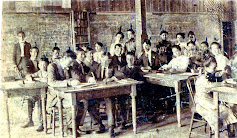That the genealogy is actually in fashion, there's no doubt. But what is really interesting about this fashion, is that, from the beginning of its revival as a popular hobby, it was manifested as a remarkable example, an authentic model of universal cooperation. Cooperation is one of the most important engines of the evolution. Why? For a simple reason: everybody wins. To enlighten this matter we can appeal to a known theoretical problem: The Prisoner's Dilemma. Originally framed in 1950 by Merrill Flood and Melvin Drescher, years later William Tucker formalized the game with prison sentence payoffs. In the generalized form, is a card's game with a banker and two players, with only two cards each: "cooperate" and "defect". Each player puts one card face-down in front of the banker. At the end of the turn, the banker turns over both cards and give them the payments according to these rules: 1) If both players cooperate, they will be rewarded with $ 300.- each. 2) If one player defects and the other one cooperates, the first one is rewarded with $ 500.- and the one who cooperated receives the sucker's payoff of a $ 100.- punishment. 3) If both players defect, they receive the punishment of $ 10.- each for mutual defection, which is not a benefit for anybody. Then, the question is: how would you play? If you evaluate that your opponent plays "cooperate", your best option is "defect", of course (you will gain $ 500.-). But if you think that the other player plays "defect", your best option is not "cooperate", (you may loose $ 100.-) but "defect", indeed. As you see, always the best option is "defect". No doubt. Then, both players evaluate both possible outcomes, and they play "defect" each. And they loose $ 10.- each. Magically, the best option was transformed in the worst one for everybody. In the next hand, you know that your opponet already played "defect", and you cannot run the risk of being punished with $ 100.- if you cooperate. In the case that you had played "cooperate" in the former hand, then, you'll play "defect" now by retaliation. As the other player thinks in the same way, because he won a good prize, or he cannot run the risk either, the same outcome than before is repeatedly played back again. Only if both players understand that the best option is "cooperate" for both of them, and they initially play that way, they will gain $ 300.- dollars always in every turn. This dilemma was applied to all the human interaction and to all the living beings in general. In biology, ethology, politics, economy, sociology, sports, etc. And to all the relations between biologic structures. And, as we are biologic structures, we unconsciously follow this game. Take a look at the world in which we live, and tell me if it's not this way. An experiment based in this dilemma (Tversky, Amos, at the MIT, 2004), showed, as an evidence, that as too much, only the 40% of the players choice the mutual cooperation. You can make a mind game trying to apply the dilemma to whatever you want: it always matches in every interaction in the real life.
It's obvious that genealogy, with its aspect of international cooperation, is a step forward in human evolution. It doesn't mean that we don't have to pay for what is valuated in money, of course. But this wonderful genealogist's world should be considered with more attention by all the social institutions. It evolved faster than others, and with firm steps. Just, exactly, because of its characteristical smart universal cooperation.
Monday, July 13, 2009
GENEALOGY: A NEW MODEL OF INTERNATIONAL COOPERATION
Subscribe to:
Post Comments (Atom)























No comments:
Post a Comment